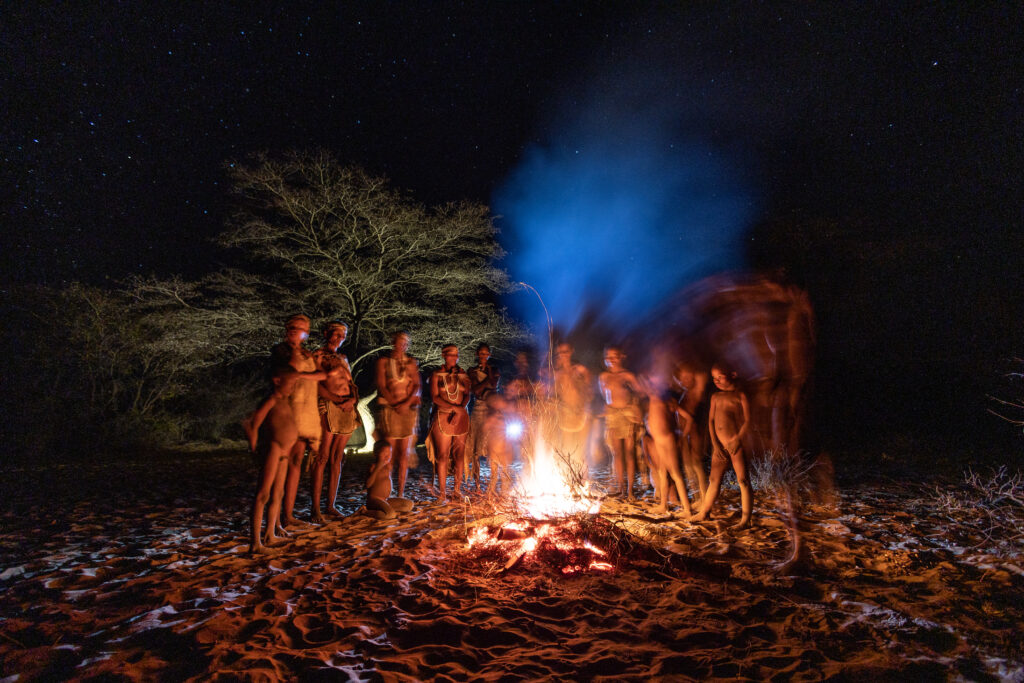The FROST San Bushmen Photographic Tour was a truly remarkable experience, not only from a photographic perspective but on a deeply personal level. Immersing myself in the ancient Ju/’Hoansi San Bushman culture, living alongside them, and participating in their daily rituals of hunting and gathering felt surreal. There were moments at night, sitting around the fire, listening to stories, and learning their healing dances under a sky full of stars, where I had to pinch myself to make sure it wasn’t a dream. Knowing that in a few years this unique experience may no longer be possible, as their culture fades away, made it even more poignant. The conservancy is one of the last places on earth where the San are still allowed to practice their way of life, and learning about the struggles they’ve faced through forced removals and court battles felt like witnessing the blueprint of how to lose a culture.
From the moment we arrived, we were welcomed with open arms by the Ju/’Hoansi San. Their hospitality was unmatched, and they were eager to share their deep knowledge of the natural world—wisdom passed down for generations. Unlike some cultural tours I’ve experienced, where secrecy is sometimes maintained, the San were incredibly proud and willing to teach us. From hunting with lions to understanding natural remedies, they told endless stories of how to survive in the Kalahari. Learning about their mythologies, such as what the birds, clouds, stars, and sun communicate, was fascinating. Being with the descendants of the oldest humans on earth, reading the earth and the Milky Way, is an experience very few people get to have.
As we drove along the long, dusty roads so iconic to Namibia, heading toward the Ju/’Hoansi San village, I felt an incredible sense of freedom. This northeastern region of Namibia, close to the Botswana border, is wild and exciting. Our guides, Xow and Simxow, were waiting at the entrance to FROST’s Baobab Camp, nestled under a magnificent baobab tree. The camp’s shade was a lifesaver in the Kalahari heat, and the private bush bucket shower added a charming touch to our stay. The best part? It is not far from the traditional San village, which made our photographic opportunities even more exciting.
Our days were spent gathering food with the San women, learning how to dig for roots, leaves, berries, and bulbs, while being taught which plants treat ailments like snake bites, stomach pain, arthritis, and more. Eating wild bush potato and drinking water from the water root, kambro, felt like a rare privilege. The San Bushmen passed down their knowledge through stories, and it was amazing to witness their storytelling as we walked through the bush. They showed us how their god, Bihisabalo, taught them to make fire—the first humans to do so. Watching them light a fire by rubbing sticks together was like stepping back in time.
One of the more fascinating moments was learning about the Commiphora angolensis plant, whose larvae they use as poison on their spears for hunting. There were also plants they used as natural soap. Their knowledge of the land and its plants is astounding; they must be among the best botanists in the world, never mind their skills as hunters and trackers.
Photographically, this tour was a playground for creativity. We experimented with off-camera flashes and slow shutter speeds, capturing the Ju/’Hoansi San as they danced around the crackling fire under a canopy of stars. One of my favorite shots was of an elderly woman smoking her iconic pipe, framed by the sacred baobab tree. With Kirsten’s help, we used a torch to highlight the smoke, creating a stunning image against the night sky. The morning after, we captured a family portrait at sunrise, the long shadows of the baobab tree stretching behind them, their spears in hand. The process took time and teamwork, but the result—a stylized, dramatic group photograph—reminds me of the work of Jimmy Nelson, and it became one of my most cherished black-and-white photos from the trip.
Kirsten’s guidance was invaluable in helping me create powerful compositions. Whether it was using the branches of the baobab to frame a hunter or creating dynamic group photos, the trip left me with a portfolio of images that captured the essence of this extraordinary culture.
One of the most thrilling parts of the trip was photographing the San’s hunting techniques. Walking with them through the tall grasses, following animal tracks, and witnessing their persistence hunting method was both exciting and humbling. I was on edge, watching them track animals, listen to alarm calls, and follow their instincts through the bush. Seeing how they use every part of the animal—from drying the meat to crafting clothing from the hide—showed their deep connection and respect for nature. Their most recent successful hunt was a porcupine, and watching them work the land with such precision and intuition was nothing short of fascinating.
We ended our adventure along the Okavango River, spending time with the Mbunza people and learning about their unique fishing techniques. Reflecting on the trip, it was one of the most exhilarating yet peaceful experiences of my life. Living without fences between us and the wildlife, and having such intimate time with the San people, was a rare privilege. While Namibia is famous for its dunes, Skeleton Coast, and the Himba people, the San are often overlooked. I highly recommend adding this cultural experience to your bucket list. The sunsets, particularly under the ancient baobab tree, were spectacular. The photographic opportunities for classic portraits and breathtaking landscapes were endless.

Stay ahead of the adventure. Be the first to know about our newest destinations—sign up now!

